by Lisa Cooke | Aug 4, 2016 | 01 What's New, Records & databases
You will all feel a little lucky this week with new and updated genealogical records for Ireland and several states across the U.S. Records from Nevada, Nebraska, Georgia, Pennsylvania, and Minnesota are on the list. Updates to two of the Freedmen’s Bureau record collections will wrap up this week’s records you can dig into.
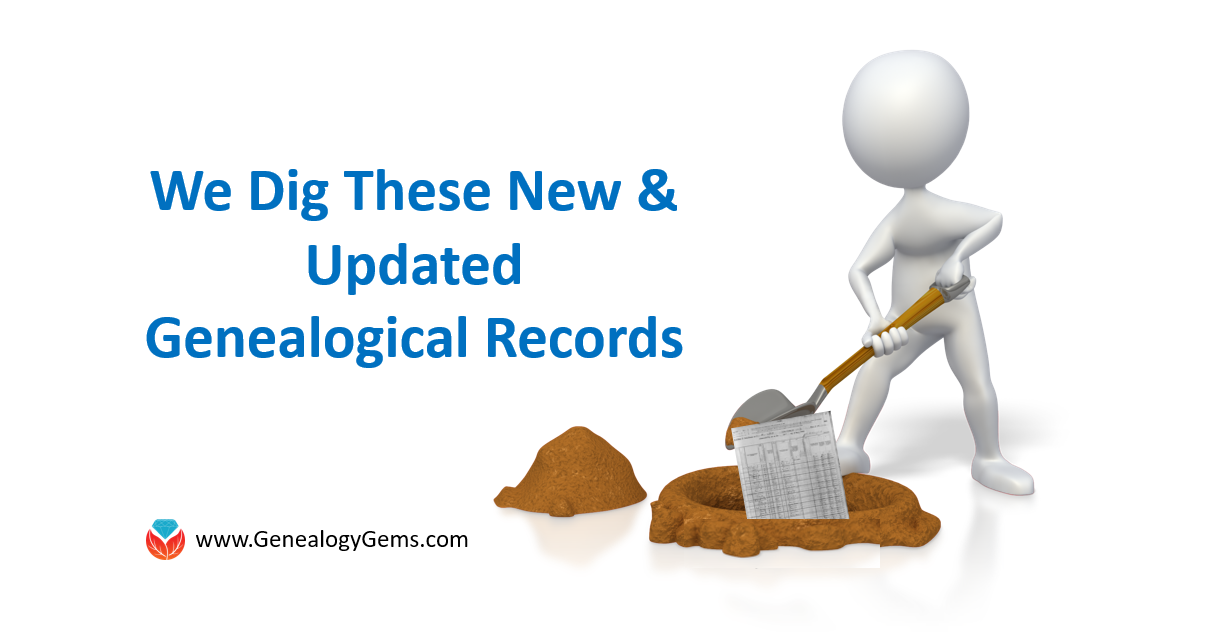
IRELAND – RECORDS, GUIDES, AND BOOKS
The New England Historical and Genealogical Society is offering access to their Irish resources for FREE for a limited time. So hurry before it ends on August 9th and see what luck you have digging up your Irish ancestors.
You will need to sign-up, but remember, it’s free. Once you have logged on, you will begin your search here.
Many Irish researchers have difficulty finding records because of the destruction of the Public Record Office in 1922. Not only can you browse the records available, but also the subject guides and books for Irish genealogy.
UNITED STATES – PENNSYLVANIA – NATURALIZATION RECORDS
The Chester County, Pennsylvania website has made their naturalization indexes available for the year span of 1798-1935. To search their indexes is free, but there is no name search field. You may have to scan several pages to find the record that may interest you. The database is also available to search from Ancestry.com and allows you to search by name, date of event, and place of origin.
The index of naturalizations include the name of the individual, name of native country, and a date. The original record could hold additional information. You can request a copy of the original record from their webpage. To learn more about that, click here.
UNITED STATES – NEVADA – MARRIAGE & DIVORCE
The most difficult records too find are often those that were created within the last 50 years. Due to the scarcity of recent records, we are pleased to see Ancestry has added a new database titled Nevada, Marriage Certificates, 2002-2015. You can search by name, date, location, and spouses name.
The digital image of the marriage records differs from year to year and location to location, but generally, you will find the couples’ names, ages, date and location of the marriage, and the person who officiated the wedding.
Nevada, Divorce Records, 1968-2015 has recently been updated on Ancestry as well. This index includes nearly half a million divorce records. You can use the index to locate the county the divorce took place, and then contact that county for the original records. You won’t find the reason for divorce in this index, but you can find the county of divorce and the divorce file number that will help locate the further records you want.
UNITED STATES – NEBRASKA – PASSENGER LISTS
A passenger list database for Omaha, Nebraska? Yep, but these are passenger and crew lists of air manifests between the years of 1958-1965. The collection is titled Omaha, Nebraska, Passenger and Crew Manifests of Airplanes, 1958-1965. If your Omaha relative did a lot of air travel, these records may be of interest to you. These records were were recorded on a variety of forms turned over to the Immigration and Naturalization Service. Some details included the name of the airline, type of aircraft, flight number, places of departure and arrival, dates of departure and arrival, full name, age, gender, physical description, military rank (if any), occupation, birthplace, citizen of what country, and residence. For military transports, you may even find the next of kin, relationships, and addresses. Later, manifests may include visa or passport numbers.
UNITED STATES – MINNESOTA – PASSENGER LISTS
The same is true in this database, Minnesota, Passenger and Crew Lists, 1957-1962 at Ancestry. This collection includes both air travel and ships coming into Minnesota ports. The original records were originally digitized by the National Archives and Records Administration. Information you may collect from these digital images include:
- Name
- Age
- Gender
- Ethnicity, nationality or last country of permanent residence
- Destination
- Arrival date
- Port of arrival
- Port of departure
- Ship name
UNITED STATES – GEORGIA – BONDS AND LICENSES
Ancestry has added the Savannah, Georgia, Licenses and Bonds, 1837-1909 database this week. You will find digital images of records from the City of Savannah’s Clerk of Council relating to people and businesses. These records usually include the name of person’s name, occupation, name of business, record date, record place, and subject.
UNITED STATES – FREEDMEN RECORDS
FamilySearch has updated two of their existing collections within the Freedmen Bureau Records. The United States, Freedmen’s Bureau Ration Records,1865-1872 and the United States, Freedmen’s Bureau, Records of the Superintendent of Education and of the Division of Education, 1865-1872 have been able to be browsed for some time. While not all the records have been indexed by name for easy searching, many have. You will want to first run a search by your targeted name. You can browse all the digitized images, but it won’t be easy. The ration records are not filed by county, but by film number. However, if you want to browse the collection of education records, they are searchable by state, then date.
MORE GEMS ON IRISH GENEALOGY
Beginning Irish Genealogy: Tips and FREE Records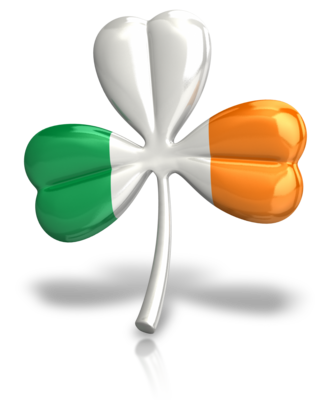
A Comprehensive Way to Learn How to Research Irish Genealogy
Irish Genealogy: Find Your Poor Ancestors in Ireland
by Lisa Cooke | Sep 23, 2016 | 01 What's New, Irish, Records & databases
We are digging deep into these new and updated genealogical records this week. We begin with several genealogical records for Ireland and Scotland, then new additions in Argentina. To end our list, a couple of fun finds in Minnesota and the state of Washington!

Ireland – Valuation Office Books
New collections have been added to Findmypast and the first is titled Ireland Valuation Office Books. With just under 2 million records, this collection contains several types of manuscript records including field books, house books, quarto books, rent books, survey books, and more.
Each record includes both a transcript and an image of the original document. The amount and type of information will vary depending on the date and nature of the document. Some book types, such as tenure books, include notations about the property as well as notes on the cost of rent and additional observations. House books include descriptions of the property. Quarto books include observations about the tenement.
Ireland – Will Registers
Also new at Findmypast, Ireland, Original Will Registers, 1858-1920 is a collection with over 181,000 records. These records are derived from district courts and held by the National Archives of Ireland. Wills from Northern Ireland are included, up until 1917. Each of the records contain a transcript and an image of the original source document.
Each transcript will provide you with a name, whether the person is heir, executor, or deceased, name of the deceased, and whether the document is a will, grant of probate, or an administration. From the images, you can determine dates, address of the parish, names of other heirs, and other various details.
The images provide much more detail about your ancestor’s will. Most entries have your ancestor’s death date, death place and who inherited the deceased person’s property, and processions. The will can provide the names of many other relations and explain their family connections.
Some wills are more than one page, so you will need to use the arrow on the right side of the image to continue reading the document.
Ireland – Church Records
Lastly, Findmypast has added the new collection titled Ireland, Catholic Qualification and Convert Rolls, 1701-1845. You can search lists of over 50,000 Irish Catholics who swore loyalty to the crown or converted to Protestantism. As a note of interest, Catholics were restricted from owning property or having businesses during the Penal Laws of the 18th century. Because of this, many chose to either convert to the Church of Ireland or swear loyalty to the crown so they qualified for certain rights.
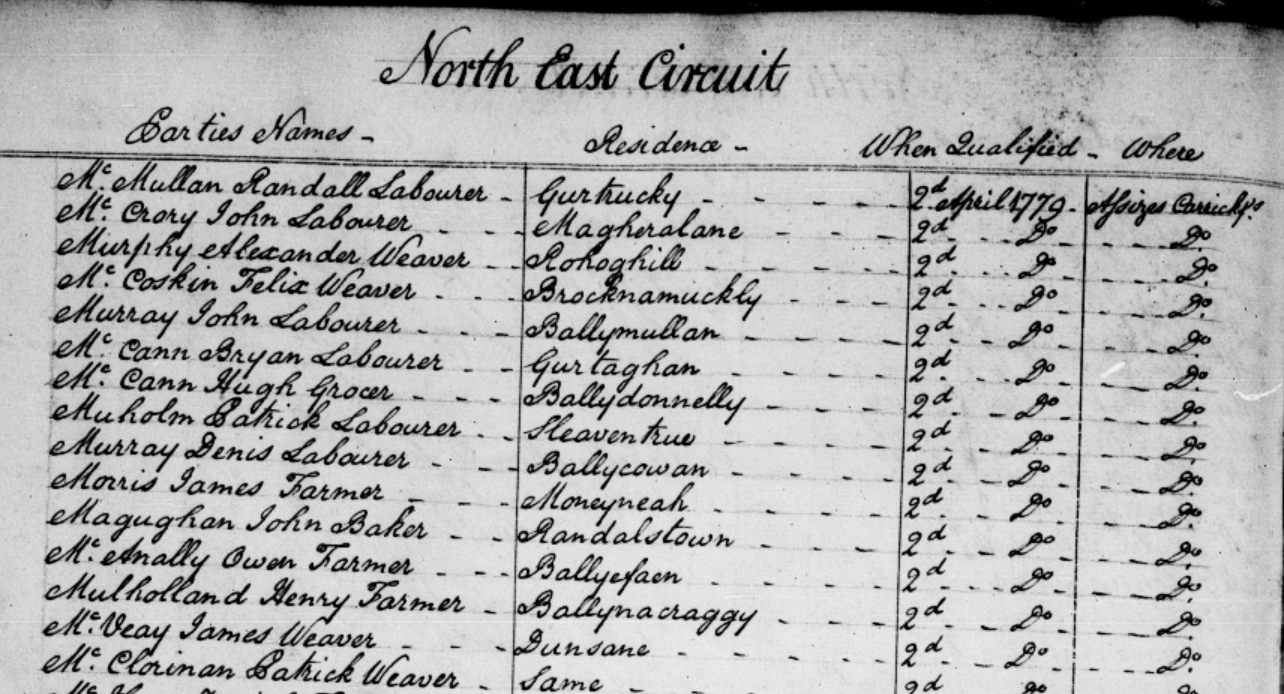
Each record contains a transcript and an image of the original entry. The amount of information varies, but you should be able to find a name, an address, occupation, date of conversion or qualification, date of enrollment or court hearing, and the court.
Glasgow – Electoral Registers
Ancestry has made available over 100 years of electoral registers from the Mithcell Library’s family history collection. These voter rolls have been digitized and can be found in the collection titled Glasgow, Lanarkshire, Scotland, Electoral Registers, 1857-1962.
Electoral registers may provide a name and place of residence, a description of property, and qualifications to vote. Registers were compiled at a local level, with names appearing alphabetically within the wards or districts. Many of the registers in this database have been indexed electronically, which allows you to search them by name, but if you’re searching for a somewhat common name it will be helpful to know the area in which your ancestor lived to narrow your results.
Remember: Parliamentary Division boundaries may have changed over time. If you are looking for a particular parish or place, try searching using the key word field rather than browsing the image sets listed by Division.
Korea – Various Records
Though these two new Korean database collections hold few records in number and they are browse-only at this time at FamilySearch, they are a wonderful step in the right direction. Korean records of genealogical value are not always easily found online. These new Korean collections include:
Korea, Local History, 655-1935 – A small collection of local histories and town records from Korea. The records are written in Korean using Chinese hanja characters. This collection will be published as images become available, so check back from time to time to see what’s new.
Korea, School Records, 1958 – Only 149 images are digitized at this time. We will be watching this closely and update you as new records become available.
In the meantime, see what other collections FamilySearch has for Korea by clicking here.
Argentina – Cordoba – Church Records
FamilySearch has also e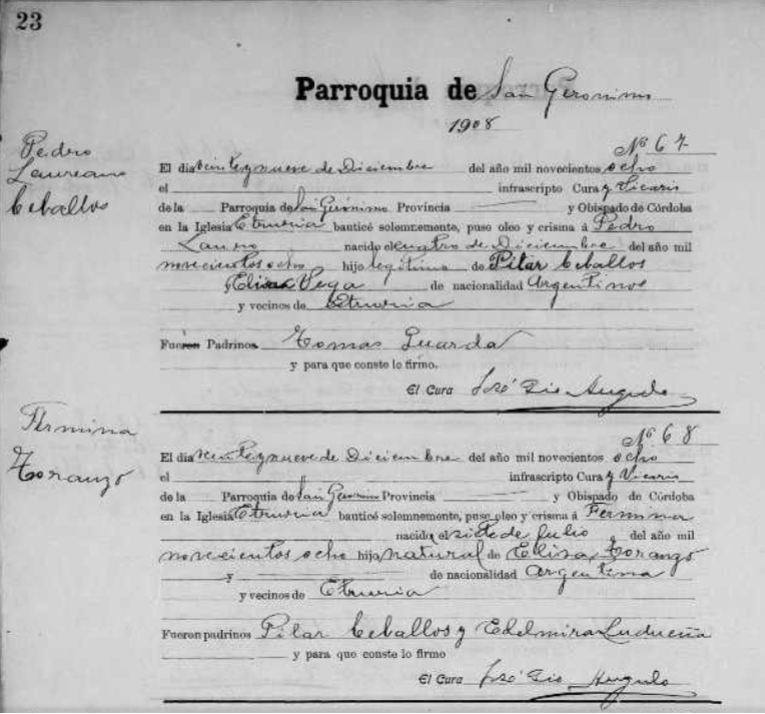 xpanded their Argentina Catholic Church Records in their collection titled Argentina, Cordoba, Catholic Church Records, 1557-1974. This collection nearly doubled with newly digitized and indexed records.
xpanded their Argentina Catholic Church Records in their collection titled Argentina, Cordoba, Catholic Church Records, 1557-1974. This collection nearly doubled with newly digitized and indexed records.
These records are in Spanish. This collection of church records includes baptism, confirmation, marriage, divorce, and death records for parishes in the Córdoba Province.
Catholic Church parish registers are a major record available to identify individuals, parents, and spouses before 1930. After this date, civil authorities began registering vital statistics, which by law included people of all religions.
United States – Washington – Marriage Records
Updated at Ancestry, Washington, Marriage Records, 1854-2013 contains both images and indexes extracted from various records of marriages in Washington.
Marriage records offer the basic facts such as bride, groom, date, and place. These images of marriage certificates may also include additional information such as:
- addresses
- ages
- race
- birthplaces
- occupations
- marital status (single, divorced)
- whether a first marriage
- fathers’ names and birthplaces
- mothers’ names, maiden names, and birthplaces
This database does not contain an image for every document included in the index.
United States – Washington – Naturalizations
Washington, Naturalizations, 1853-1980 database has been updated at Ancestry and contains records created as aliens applied for U.S. citizenship in the state of Washington. It includes both original records and an index extracted from naturalization documents. You will find:
- Certificates of Arrival
- Declarations on Intent
- Petitions for Naturalization
- Oaths of Allegiance
- Certificates of Naturalization
This database does not contain an image for every document included in the index.
Details contained on naturalization records varies based on the year. However, you may be able to find the following valuable information:
- name
- birth date
- country of origin
- arrival date
- place of arrival
- spouse
- children
- document type
- county
United States – Minnesota – Obituaries
FamilySearch expanded two large collections this week and one of those is the Minnesota, Obituaries, 1865-2006. Even though only about 73,000 records have been indexed, there are over 132,000 digital images in the browse-only section.
These obituaries include an index and images of newspaper obituary files filmed by FamilySearch at the historical societies in Minnesota. Indexed records and additional images will be added to this collection as they become available, so be sure to check back frequently.
Many of these digitized records are referred to as obituary cards, which means that the information has been abstracted from the original source. These cards usually contain the following information:
- Name of the deceased
- Age
- Death date
- Names of parents, spouse, children, siblings or other relatives
- Name of newspaper, date and place of publication
- Birth date and place
- Other details such as military service
We hope you enjoy the many new and updated genealogical record collections this week and that you make some new discoveries for your family tree. Don’t forget to share this post with your genealogy friends and help them in their research journey as well!
by Lisa Cooke | Oct 21, 2016 | 01 What's New, Records & databases
Scottish genealogy records are as popular as plaid this fall. Deeds, paternity records, and censuses are just a sampling. Also this week, records for Ontario, New York State, Philadelphia, and the women’s suffrage movement!
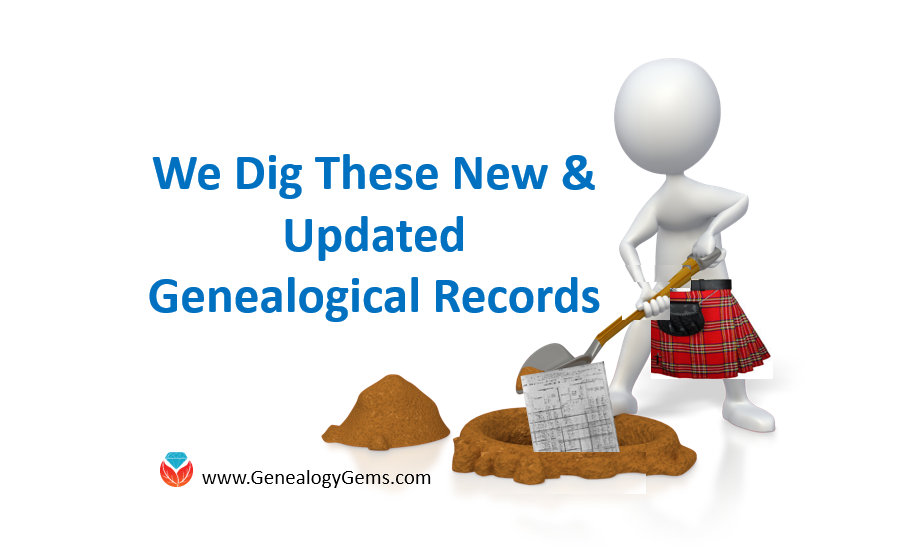
Scotland – Deeds
Findmypast offers Scotland Deeds Index 1769 with over 1,000 transcripts. This collection contains the details found in minute books kept by the Court of Session and includes a variety of different types of deeds including: assignations, discharges, bonds, obligations, protests, and leases. Each deed transcript will record the type of deed, the date it was recorded, and the two parties named in the original court document, their addresses, and occupations.
By understanding what each type of deed is, you may be able to glean additional clues to your research. For example, a discharge is granted once evidence is shown to a granter that a debt or payment has been paid in full. Discharges were also given to release an individual from specific tasks or duties. A heritable bond, however, is in regard to land, property, or houses that pass to an heir or next of kin. In some of these cases, the records could be proof of parentage. For more details about the types of deeds in this collection, read here.
Scotland – Paternity Decrees
Containing over 25,000 records, Scotland, Paternity Decrees 1750-1922 will help you find out if your ancestor was involved in a paternity dispute that appeared before Scotland’s Sheriff Court. These records could identify illegitimate ancestors and break down brick walls in your research. You will find cases from jurisdictions across Scotland including: Kirkcudbrightshire, Lanarkshire, Midlothian, and Roxburghshire.
Each record offers a date of birth and sex of the child whose paternity is in question as well as the name, occupation, and residence of both the pursuer and defender.
Scotland – Census and Population List
Also at Findmypast, Scotland Pre-1841 Censuses and Population Lists now contains over 3,500 early census fragments and parish lists from Jedburgh, Greenlaw, Ladykirk, Melrose, Applegarth, and Sibbaldbie. Until 1845, these courts were for governing the local parish and overseeing parish relief. Many kept up-to-date lists of the parish residents, their occupations, and their birth places.
The details recorded in each transcript will vary, but most will include a birth place, occupation, and address.
Scotland – Registers & Records
Over 1,700 new records have been added to the collection titled Scotland Registers & Records at Findmypast. These additions include Written Histories of the Highland Clans & Highland Regiments.
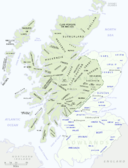
By Gsl [Public domain], via Wikimedia Commons
Scotland Registers & Records contain images taken from 21 different publications related to Scottish parishes and families. The records vary and include parish records, topographical accounts, and memorial inscriptions.
Some of these records reach back as far as the year 1100! To see a list of each of the publications within this collection, click here, then scroll down to the subheading, “What can these records tell me?”
Canada – Ontario – Birth Index
Findmypast offers a collection titled Ontario Birth Index 1860-1920. It is comprised of 1.7 million civil registration records. Civil registration in Canada is the responsibility of the individual provinces and territories and it was not standard practice until the late 1800s.
Each record contains both a transcript and an image of the original document. Information should include:
- Ancestor’s name and date of birth
- Place of birth
- Parents’ names
In some cases, the record may also provide:
- Parents’ occupations
- Where the parents were married
- Name of the attending physician
- Address of residence
Special Savings for You

If you are interested in subscribing to Findmypast, we want to let you know about a special savings. Findmypast is now offering a year subscription for $34.95, a savings of $79.95. Click here for more details!
United States – New York – City Directories
New York Public Library is digitiz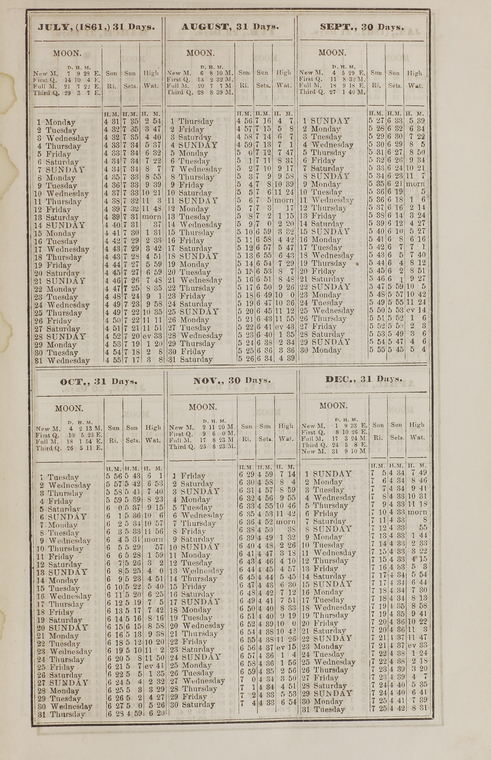 ing its collection of New York City Directories, 1786 through 1922/3, and sharing them for free through the NYPL Digital Collections portal.
ing its collection of New York City Directories, 1786 through 1922/3, and sharing them for free through the NYPL Digital Collections portal.
The first batch—1849/50 through 1923—have already been scanned and the 1786–1849 directories are in the process of being scanned. The whole collection will be going online over the coming months.
See the digitized directories here.
City directories contain more than just names and addresses. You may be surprised to learn that they record the price of travel and postage, the kinds of occupations around the city, the layout of streets, and at what time the sun was predicted to rise and set!
City directories might also contain images, maps, illustrations of buildings, and advertisements.
United States – Massachusetts – Women’s Suffrage
The Massachusetts Historical Society has announced that seven collections relating to women in the public sphere have been digitized. A grant made it possible to create high resolution images that are accessible at the MHS website, as well as preservation microfilm created from the digital files. The seven collection titles and links are listed below.
Juvenile Anti-Slavery Society records, 1837-1838
http://www.masshist.org/collection-guides/view/fa0427
Massachusetts Association Opposed to the Further Extension of Suffrage to Women, 1895-1920
http://www.masshist.org/collection-guides/view/fa0121
New England Freedmen’s Aid Society records, 1862-1878
http://www.masshist.org/collection-guides/view/fa0423
Rose Dabney Forbes papers, 1902-1932
http://www.masshist.org/collection-guides/view/fa0212
Society for the Employment of the Female Poor trustees’ reports, 1827-1834
http://www.masshist.org/collection-guides/view/fa0428
Twentieth Century Medical Club records, 1897-1911
http://www.masshist.org/collection-guides/view/fa0411
Woman’s Education Association (Boston, Mass.) records, 1871-1935
http://www.masshist.org/collection-guides/view/fa0393
United States – Pennsylvania – Newspapers
Check out the Philadelphia Inquirer on Newspapers.com. The Philadelphia Inquirer is one of the oldest surviving papers in the United States. The Philadelphia Inquirer was established in 1829 and originally titled the Pennsylvania Inquirer. It was originally a Democratic paper that supported President Jackson.
This collection covers the years of 1860-2016.
If you’re looking for specific mentions of an ancestor, you might find them in lists of death notices, marriage licenses, local social news, the day’s fire record, or building permits issued. This newspaper is searchable by keyword or date.
United States – Nebraska – Marriages
New this week at FamilySearch are the Nebraska, Box Butte County Marriages, 1887-2015. Information found in these marriage records does vary, but you may find any of the following:
- Name
- Age
- Estimated birth year
- Birth city/town, county, state, and country
- Marital status
- Marriage date
- Marriage city/town, county, and state
- Parents’ names
- Previous spouse
More Helpful Tips for Scottish Genealogy
Lisa’s Premium Member episode 116 is 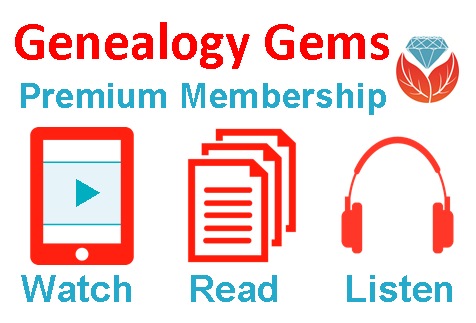 just what you need. Marie Dougan, a professional genealogist specializing in Scottish research, joins Lisa in this episode to talk about how to research Scottish ancestors. If you haven’t taken that plunge and become a Premium Member, why not do so today! There are over 100 Premium Member podcast episodes and over 30 video classes on a wide variety of genealogy topics waiting to inspire and educate. Join today!
just what you need. Marie Dougan, a professional genealogist specializing in Scottish research, joins Lisa in this episode to talk about how to research Scottish ancestors. If you haven’t taken that plunge and become a Premium Member, why not do so today! There are over 100 Premium Member podcast episodes and over 30 video classes on a wide variety of genealogy topics waiting to inspire and educate. Join today!
by Lisa Cooke | Nov 4, 2016 | 01 What's New, Records & databases |
Swedish-American newspapers are our first stop as we head off the beaten path. This week you’ll discover special record collections of Burke County, North Carolina yearbooks, photo images for Scotland, and State Militia records. Also this week, German civil registrations, Utah divorces, and lots of Irish goodies.
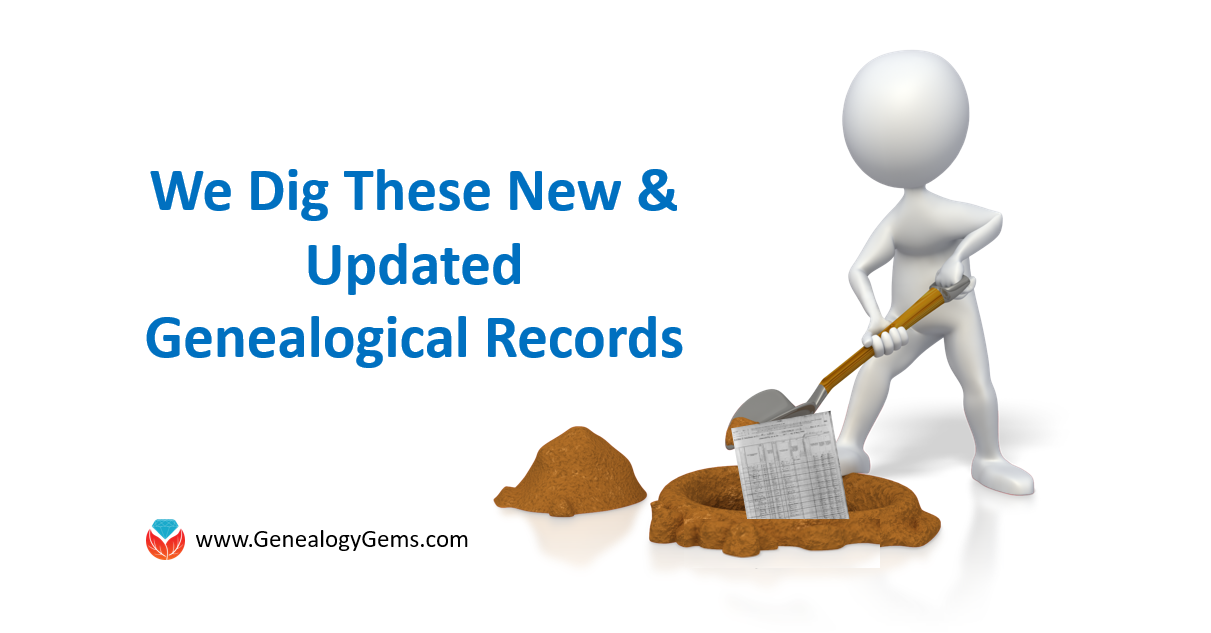
There are more online records than just those found at Ancestry, Findmypast, MyHeritage, or FamilySearch. Lesser known record collections pack a powerful punch to your family history research!
Swedish-American Newspapers
The Minnesota Historical Society has made some Swedish-American newspapers available online for the first time. This past week, Swedish-American Newspapers were made available through an online portal. Users can explore more than 300,000 pages from 28 different Swedish-American newspaper titles published across the U.S. between 1859 and 2007.
The portal is available in Swedish and English and includes a keyword search.
United States – North Carolina – Burke County – Yearbooks
The North Carolina Digital Heritage Center has a statewide digital publishing program located at the University of North Carolina at Chapel Hill. The center works to digitize and publish historic materials online.
Among their digital holdings, more than 60 years worth of yearbooks are now available to view online. The schools covered include:
Yearbooks provide enriching details into the lives of our ancestors and can be especially helpful in finding names of living family members!
United States – North Carolina – Militia
Also for North Carolina, the State Archives there have made their militia records, specifically the troop returns for the 18th and 19th centuries, available online.
The Troop Returns collection includes lists, returns, records of prisoners, and records of draftees, from 1747 to 1893. The majority of records are from the Revolutionary War, North Carolina Continental Line.
Militia records generally include the names of officers and soldiers, and are usually organized by district or county. Continental line records include field returns, general returns, draft records, and enlistment records.
This collection is a work in progress. As more records are digitized, they will become view-able online. In the meantime, see what’s there by checking out a helpful index in pdf form here.
Canada – Books
Though these new books added to the shelves of the Library and Archives Canada are not online, the information may be of value to you. Several new books are available to view in-person at the Library and Archives Canada.

Some of the new listings include:
Obituaries from the Christian guardian, 1891 to 1895, by Donald A. McKenzie (AMICUS 42197735)
American loyalists to New Brunswick: the ship passenger lists, by David Bell (AMICUS 43913838)
The link to the AMICUS record gives the call number you need to find the book on the shelves.
Baptisms and marriage books for several churches also are among the new publications. For a complete listing of the new books, click here: https://thediscoverblog.com/2016/10/28/new-books-in-the-genealogy-services-collection-at-395-wellington-october-2016/
Germany – Civil Registrations
New this week at FamilySearch.org are the Germany Bavaria Nuremberg Civil Registration 1803-1886 collection. This record set is an index only of over 1.2 million civil registrations.
The collection includes birth, marriage, and death records from Nuremberg.
Birth records may include:
- Name of child
- Names of parents
- Place of residence
- Gender
- Date of birth
Marriage records may include: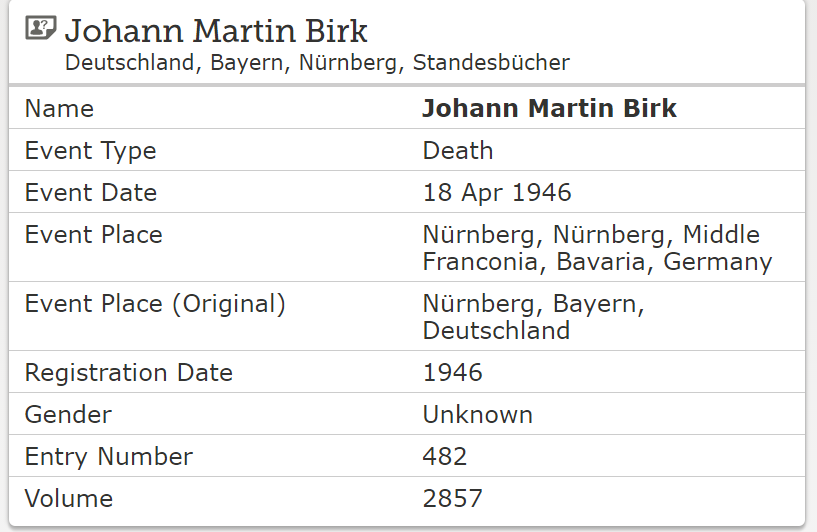
- Name of bride and groom
- Place of residence
- Name of bride’s parents
- Name of groom’s parents
- Groom’s date of birth and birthplace
- Bride’s date of birth and birthplace
Death records may include:
- Name of deceased
- Age at death
- Place of residence
- Date of death
United States – Utah – Divorce Records
Findmypast has added Utah Divorces to their collections. More than 177,000 records from Utah district courts cover the years of 1997 to 2016. Each result includes a transcript that will reveal the date the divorce was filed, the petitioner, respondent, attorney, case type, and the judgment that was reached.
Ireland – Cavan – Registers
Cavan Registers & Records currently includes only one title named “Crosserlough Census Index 1821.” The 1821 census of Crosserlough, County Cavan, was taken on 28 May 1821. The Four Courts fire in Dublin destroyed the original census documents, but a copy was made prior to this.
There are near 8,000 individuals listed in the 1821 census. Each entry records an individual name, age, occupation and relationship to the head of household.
Ireland – Kilkenny – Registers
Kilkenny Registers & Records are presented as PDFs. The collection includes the Castlecomer Census Index 1901 compiled in 2000 by Tom Delany.
The publication is a summary of the population of Castlecomer in 1901. It lists the names, ages, and occupations of the all the inhabitants. On image number 204 is the beginning of an index of all the names found in the publication to help you.
Ireland – Dublin – Registers
Ten new publications have been added to the collection of Dublin Registers & Records. These new items include school registers, district and street censuses, business directories, and monumental inscriptions. The collection also includes parish records from the Church of Ireland.
Ireland – Newspapers
Over 1.7 million new articles have been added to the historic Irish Newspapers collection. New additions have been made to existing titles including The Irish Times and The Weekly Irish Times.
Newspapers can be searched by time-frame, place, county, and newspaper title.
Scotland – Leith – Photographs
A picture is worth a thousand words, or maybe in this case, a thousand records! A rare collection of photographs from the 1920s in Leith, Scotland is available to view online. This collection was digitized by Edinburgh University.
Though most of the images are of buildings and streets and not well labeled, if you are familiar with the area, something might stand out to you. Take a stroll down memory lane of yesteryear in Leith Scotland by clicking here.
More Gems on Researching Newspapers for Genealogy

Available at www.shopgenealogygems.com
This week we explored Swedish-American newspapers as well as some from Ireland. Perhaps you are in search of newspaper elsewhere in the world. Lisa Louise Cooke presents everything you need to know about How to Find Your Family History in Newspapers. This exceptional book is packed with information on how to find and utilize newspaper collections. Available in book and e-book, you will find
- Step by Step Instructions
- Worksheets and Checklists
- Tons of Free Online Resources
- Websites that are worth Shelling Out a Few Bucks For
- A Massive Amount of Location Specific Websites (International)
- A Case Study that Puts It All to the Test
by Lisa Cooke | Nov 2, 2016 | 01 What's New, Native American |
Here are the step-by-step instructions you need to know to effectively navigate the Dawes Applications for Native American research. Many American families have a tradition of Native American ancestry. Now through Nov. 15, 2016 Fold3 has made access to their Native American records collections free. Read on to gain a thorough knowledge of how to properly use these records and achieve research success! And sign up for our free Genealogy Gems newsletter for our upcoming posts on this important subject.
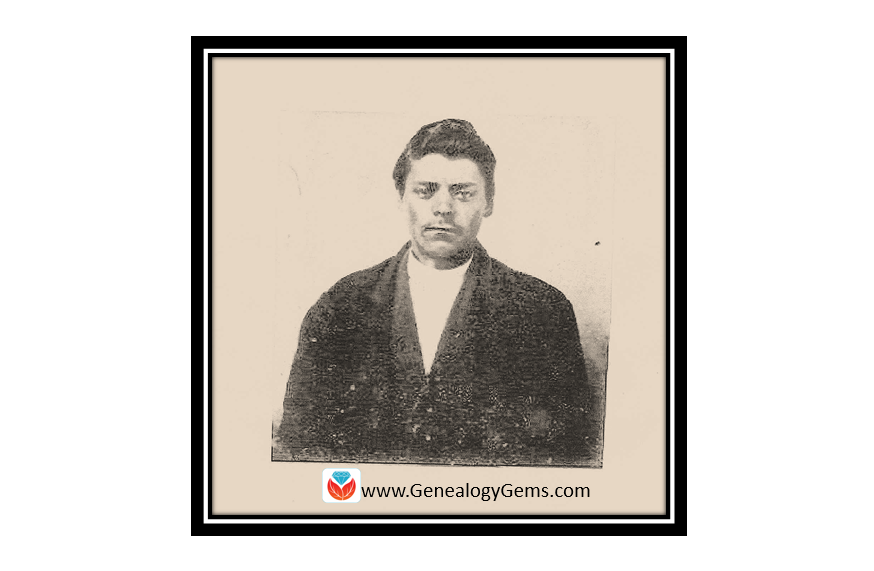
Dawes Applications for Native American Research
In 1893, an act of Congress approved the establishment of a commission to negotiate agreements with the Choctaw, Creek, Chickasaw, Seminole, and Cherokee Indian tribes. The commission became known as the Dawes commission. The commission was to divide tribal land into plots, which were then divided among the members of the tribe. The Commission either accepted or rejected applicants for tribal membership based on whether the tribal government had previously recognized the applicant as a member of the tribe. Applicants were categorized as Citizens by Blood, Citizens by Marriage, Minor Citizens by Blood, New Born Citizens by Blood, Freedmen (African Americans formerly enslaved by tribal members,) New Born Freedmen, and Minor Freedman.
Researching the Dawes Packets is tricky. One problem arises when researchers find their family members in an index and assume that means their family was a legitimate member of a tribe. That is not the case. You will find doubtful or even rejected applications as well.
The good news is that in applying, our ancestors provided lots of genealogically valuable details of their birth, residences, and family ties.
Let’s see how to use this special collection.
Dawes Packets are Listed By Application Number
It would take forever to go through the applications one by one to find your ancestor. You really need to check an index first, but Fold3 doesn’t have the index for the Dawes Packets collection available…at least as far as I have found.
Instead, I would suggest going over to Ancestry.com. There, click on Search and choose Card Catalog from the pull-down menu. In the keyword search at the card catalog, type in Five Civilized Tribes. This will give you the option of several databases, but the one we want to check first is the one titled “U.S., Native American Applications for Enrollment in Five Civilized Tribes, 1898-1914.”
Now, search for your targeted ancestor by name. In my example, I am going to search for David O. Scott.

The results indicate that David O. Scott appears in two entries. One entry gives the number of #9446 and the other is #616. I can view each of these records directly from Ancestry. The first image you see is a jacket cover, so just click the right arrow key to scroll through the digital pages contained in David’s file.
Remember, if you don’t have access to Ancestry.com, many local libraries and family history centers have free access for patrons. But, we are talking about using Fold3, so let’s pop back over there.
Go back to Fold3.com to access their Native American records. You will do this by clicking on Browse at the top of the Fold3 homepage. Next, scroll through the options and choose Non-Military Records. A new list of options will appear and you will click on Native American Collections, then Dawes Packets. The Dawes Packets that appear here on Fold3.com are first broke down into tribe, then by number.

David O. Scott’s search on Ancestry listed him as Cherokee, so I want to choose that tribe. One of his numbers was #616.

Did you notice the numbers have a “D” in front of them? These are the applications deemed “doubtful.” If you scroll down, the letter changes to “R.” These applications were rejected. We don’t know if David’s number 616 is in the doubtful category or the rejected category, so we will check both.
David’s #616 matches the D616 and now I know that his application was marked doubtful. David’s pages of information were packed with genealogical detail like family names, dates, and residences.
The 1896 Applications
Here’s another tip: Your ancestor may have applied in the first wave of applications submitted in 1896. Those applications were later deemed invalid and thrown out, but wow…you don’t want to overlook them! Whether your ancestor applied again in 1898 and you already found their Dawes Packet on Fold3, try looking at this collection as well.
The research center at the Oklahoma Historical Society webpage allows you to search the 1896 overturned applications index for free. I typed in the name of my third great-grandfather, Jacob Cole.

You can also search by tribe, however, I suggest you do not do that. Sometimes, individuals actually applied to more than one tribe because they were not sure which tribe they might belong to. By adding that criteria, you may miss your ancestor’s application all together.
Only one result appeared for Jacob Cole. On this result, you notice the tribe affiliation as Cherokee and the case/application number of 639. I will need that tribe and number to find the application at Fold3. [Note: As I mentioned earlier, this index does not tell me if Jacob’s application was accepted or rejected, but it really doesn’t matter because these applications were deemed invalid anyway.]
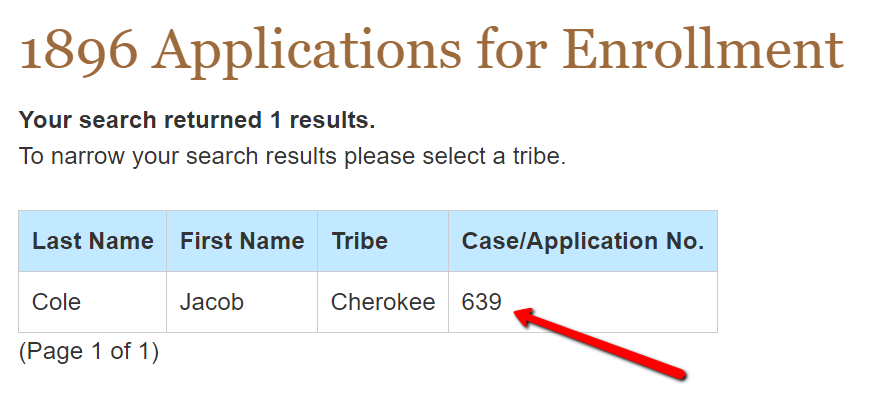
You won’t find Jacob’s overturned application of 1896 on Fold3 at this time, but it is available at Ancestry.
Where Can I find Overturned Applications for 1896?
Overturned applications from 1896 are still very valuable records. They can be found at the National Archives and Records Administration in Washington D.C., or at Ancestry.com.
Let’s look at Ancestry. Once at the homepage, click Search at the top, then choose Card Catalog from the pull-down options.
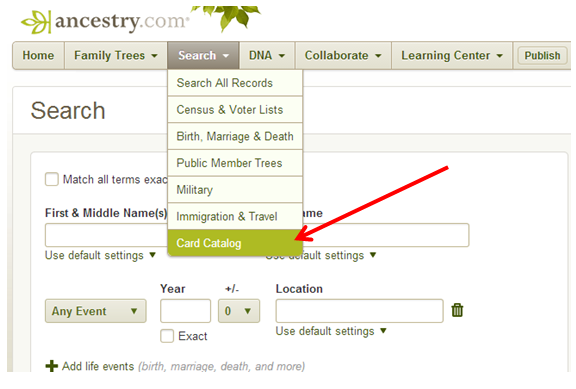 In the keyword field on the right, type in Five civilized tribes. You will see many options, but you want to click on the collection titled “U.S. Native American Applications for Enrollment in Five Civilized Tribes (overturned,) 1896.”
In the keyword field on the right, type in Five civilized tribes. You will see many options, but you want to click on the collection titled “U.S. Native American Applications for Enrollment in Five Civilized Tribes (overturned,) 1896.”

This next step is a bit tricky. You will be directed to a page that allows you to seemingly search for your targeted ancestor’s application. But, the search only searches an index for the applications. To find the entire application packet, you need to browse the microfilm by hand.
To do that, look over to the far right where it says Browse this collection. Choose from the drop-down menu which tribe your ancestor applied to…so, I will choose Cherokee Applications. Then, choose the roll number based on the application number of the packet. I can determine the correct roll number because Jacob’s application number was 639 and Roll 25 includes all applications between the numbers of 486 and 681.

Click ALL and a digital image of the microfilm pops up. You will need to browse image-by-image until you find your ancestor’s application number. Be patient. With more than 1800 images, it will take some time.
[Special Note: On the very last roll of microfilm, Roll 54, there are some miscellaneous files and applications that were received past the application deadline. These records were not included in the Master Index. If you did not find your targeted ancestor in the Master Index, check these miscellaneous records.]
I found Jacob’s application on digital image number 1405. His application packet was nine pages long. I learned the ages and names of his current wife and children, how he believes he is Cherokee through the blood of his grandfather, Hawk Bowman, and I read two witness statements about Jacob and his family.
In particular, because this record was made in the 1890s, I was able to learn of two daughters that I had never known about. Martha had been born after the 1880 census and married before 1900, never having appeared with her father in a census. The second daughter, Mary J., had been born in 1895 and died before 1900, also never appearing with her family in a census record.
More on Native American Research
We will be creating further blog posts regarding each of the Native American collection sets at Fold3.com. We want you to be able to take advantage of this awesome opportunity to view the records for free for this limited time. In the meantime, be sure to read this how-to post on using Eastern Cherokee Applications: Eastern Cherokee Applications for Native American Research
Disclosure: This article contains affiliate links and Genealogy Gems will be compensated if you make a purchase after clicking on these links (at no additional cost to you). Thank you for supporting Genealogy Gems!





 xpanded their Argentina Catholic Church Records in their collection titled
xpanded their Argentina Catholic Church Records in their collection titled 


 ing its collection of
ing its collection of 









 In the keyword field on the right, type in Five civilized tribes. You will see many options, but you want to click on the collection titled “
In the keyword field on the right, type in Five civilized tribes. You will see many options, but you want to click on the collection titled “





